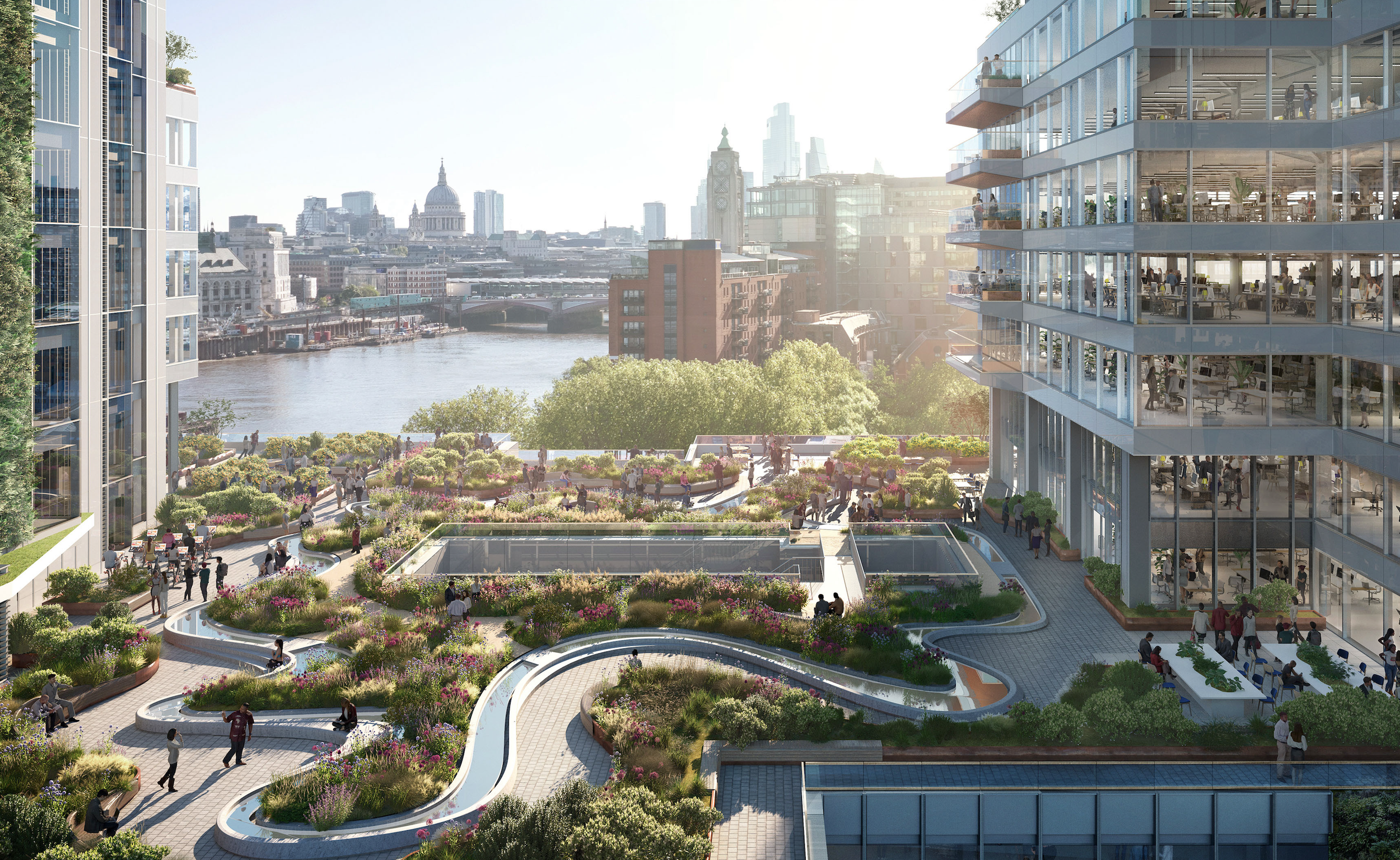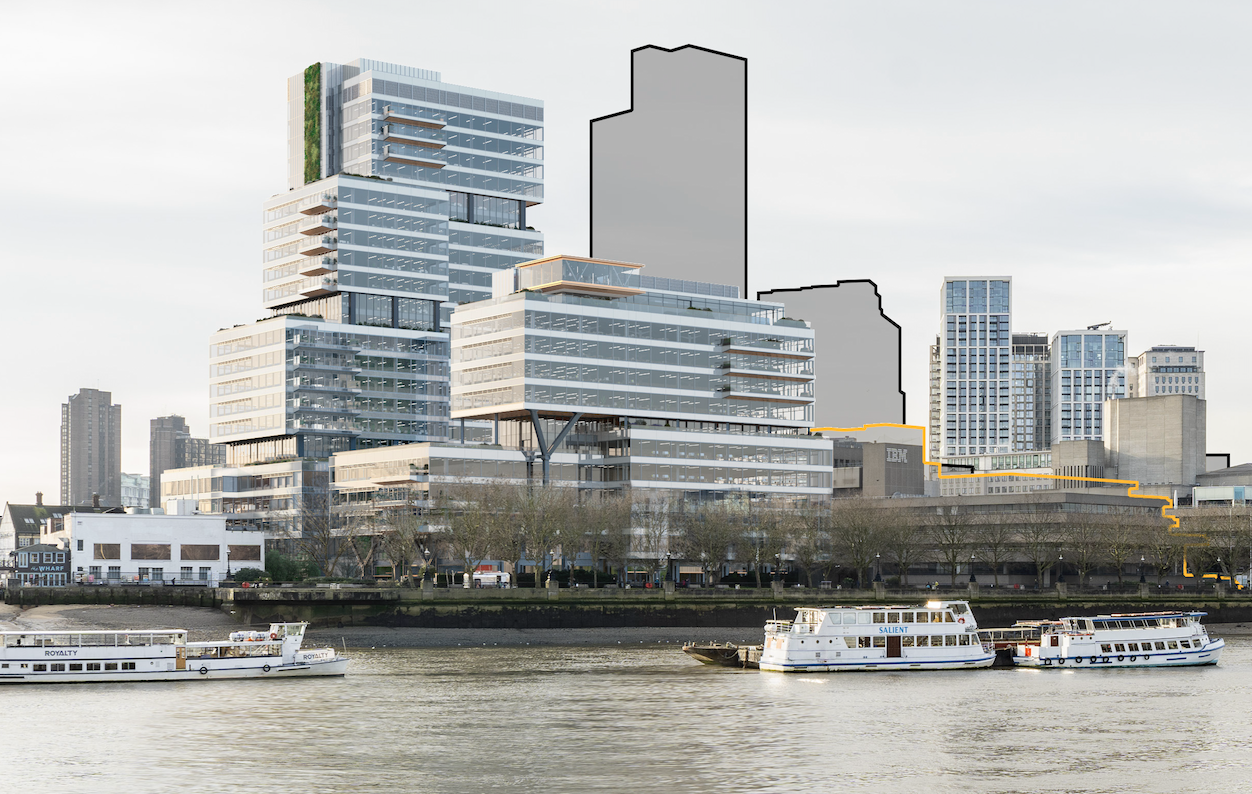Also on the gallery level will be the Designers Hub where guests can enjoy refreshments and relax before the talks in a beautifully curated space designed by Interior Design studio Kibre using furniture from luxe Italian company Arper with lighting from Zena Holloway whose bio designed lights Roots are also shortlisted for a Surface Design Show Award.
Kicking off the Speakers Programme will be the Opening Night Debate, sponsored by Mastercharge from 18.30 - 19:30, on Human Capital, Risk, and Retention. Renowned freelance writer, editor, and speaker Louis Wustemann will lead a discussion joined by esteemed panellists: Mark Shayler - Owner at Ape, Gill Parker - Non-Exec Chair at Informare, Nicola Osborn - Creative Director at Basha-Franklin, and Dr. Petrina Carmody - Chief Change Officer at Great Place To Work.
Following on from the Opening Night Debate will be , Stone and Beyond - How This Ancient Material Remains Relevant Today Matt Robb, Marketing and Media Manager for Stone Federation Great Britain, will explore the attributes of stone from various parts of the world alongside Panellists including Mr. Gokhan Karakus - co-founding curator of Adorno.design, Stefano Ghirardi - Chairman & CEO of Marmi Ghirardi S.R.L, and David Richardson - Chair of the Stone Federation Technical and Sustainability Committees. The discussion will set stone within the context of other materials and its continued relevance.
Legends live returns for its third year, this year hosted by Alys Bryan, Managing Editor of Design Insider, with three talks spread across two days, Wednesday, 7 February, and Thursday 8 February. This year’s legends consist of insightful conversations with design legends Tom Lloyd, Gurvinder Khurana and Matthew Hilton. These not to be missed conversations will draw from Alys' individual experiences and will delve into her guests' design philosophies, portfolios, and future aspirations.
The ever-popular trend predictions by Colour hive are back again and will be taking place with two talks across the Wednesday and Thursday. Featuring exclusive future insights from Colour Hive membership including MIX Magazine, Colour, Material and Finish Directions and Global Colours alongside an edit of one-of-a-kind inspirational objects and materials inspired by their 2025 design direction Hack.
The programme on Wednesday, 7 February, the day will commence at 10:45am - 11:15am, with this Surface Design Shows Charity Partner, Furnishing Futures - The Importance of Design for Mental Health/Living in the Right Environment. Furnishing Futures founder Emily Wheeler will delve into the amazing work that the charity does, and how it helps those escaping domestic abuse that have been rehomed into empty social housing. Emily will be joined by Reeba Simon, co-author of ’Scandi Rustic: Creating a Cozy and Happy Home,’ columnist for Simple Scandi Magazine, an interior and lifestyle influencer and collaborator of the Main Company. Through their individual and personal knowledge, Emily and Reena will discuss the importance of design for mental health and wellbeing, and the effects/need of living in the right environment.
Following on from this, is the talk How to Manage Sustainable Global Brands. Mark Faithfull, retail journalist, will lead a discussion with panellists; Lee Roberts - Creative Director at Zebra, James White - Practice lead at Accenture Song, and Hani Hatami - Head of Member Community at Material Bank Europe. The Thinking Green in Award Winning Design talk from 12:15 - 12:45, will be hosted by BIID President May Fawzy who joins award-winning designers Sophie Pringle - Director at Pringle&Pringle Designs, Staffan Tollgard - Creative Director & Founder of Tollgard Design Group and Anna Barber - Founder of House of Kin, to discuss challenges and opportunities in green thinking.
Another unmissable presentation is Words and Wood, scheduled from 16:00 to 16:30. Chaired by Grant Gibson, Founder of the award-winning pod cast Material Matters, the session features an insightful interview with Andrew Waugh, focusing on the intricacies of designing tall buildings in timber.
Unlock the secrets to sustainable design at the upcoming workshop, "Specifying Sustainably: A Workshop by the Sustainable Design Collective" presented by the Sustainable Design Collective (SDC). Join Harsha Kotek, Founder of WOD (Women in Office Design) & The Sustainable Design Collective, and a panel of experts including Joanna Knight – Sustainable Design Collective, Lydia Randall – BDG architecture + design, Deborah Allen – Douglas Jane Studio, Mathew Freeman – Freeman Studio, and Alex Webb – The Furniture Practice. This engaging event kicks off with a panel discussion focusing on specifying healthy materials that prioritize user well-being. Following the discussion, immerse yourself in a hands-on workshop led by SDC members. Explore samples of fabrics, paints, and furniture finishes, and gain valuable insights into identifying VOCs and healthy materials.
The exceptional line-up of speakers on Wednesday 7 February includes Kaye Preston - Design Editor, who will be hosting a talk looking at Designing for a Sustainable Future panellist include Rosey Treheane Pollock -Founder of Rosey Treherne Pollock Interiors, Cat Hoad -founder of Absolute Project Management, Jecks Stone - Founder of Persona Abode Interiors and Ana Rita Martins -Sustainability Lead for MC. Jennifer Castoldi - CEO/Chief Creative Director of Trendease who will be talking about the Design Trends and secrets hidden in New Talent, Justine Fox - Colour Design Expert Looking at How we mobilise conscious colour intelligence with panellists Richard Roberts -Managing Director at Jason Bruges Studio, Maeve Dolan - Associate at New Practice, Helena Howard -Architect at Hawkins Brown.
On the final day of the Surface Design Show, Thursday, 8 February, brace yourself for another action-packed schedule featuring an exceptional lineup of speakers. Kicking off at 10:40 - 11:00 Noam Noveh, CEO and Co-Founder of Stylib, delves into Rethinking Material Search: AI at the Service of Specifiers, exploring how technology disrupts traditional specification workflows.
Continuing the day's engaging discussions, from 12:30 - 13:00, Helen Parton, Editorial and Content Consultant, sheds light on Bringing Urban Landscapes to Life with Light, exploring the transformative role of light in urban environments with panellists John Lenehan -Global Projects Director at Acrylicize, Andy Clark - CEO of Bright Green Technology, Rebecca Cove - Business Development and Marketing Associate at Jason Bruges Studio.
The exceptional line-up of further speakers on Thursday 8 February includes the panel of lighting experts looking at Circularity in Lighting Nigel Harvey - Chief Executive at Recolight, David Clements -Chief Executive at FUTURE Design), Gary Thornton - Director at Nulty, Colin Ball - Lighting Director at BDP, Arianna Ghezzi - Associate at Lighting Design International. Mr. Gokhan Karakus - Designer, curator, business strategist, historian, architecture critic, theorist and co-founding curator of Adorno.design who will be looking at Natural Stone from Turkey, Jess Miles -Deputy Editor at Space Magazine who will be exploring the Symbios of hotel and fashion design, with panellists David Harte - Co-Head of Interiors at Studio Moren, Wren Loucks - CEO & Creative Director at BE-Kin, Nicholas Oakwell - Founder of NO Uniform.
To read the full Surface Design Show Speakers Program please visit: https://www.surfacedesignshow.com/main-stage
Do not miss this opportunity to gain insights from industry leaders and influencers at the Surface Design Show. For more information and to register for free, visit: https://www.surfacedesignshow.com/register-interest
www.surfacedesignshow.com
https://twitter.com/surfacethinking
https://www.facebook.com/SurfaceThinking
https://www.pinterest.co.uk/surfacethinking
https://www.instagram.com/surfacethinking
#SDS24 #SDAwards
















